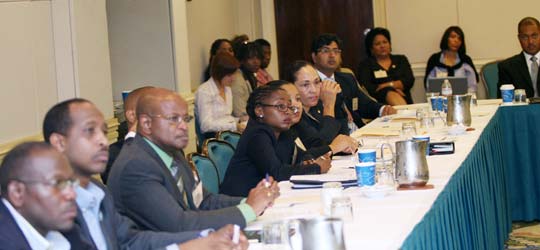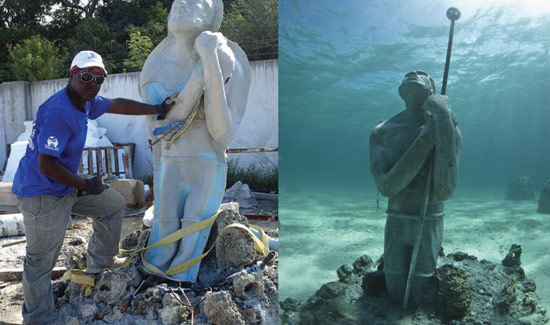
Nassau, The Bahamas – Sun, ocean and wind are the future natural resources scientists will use to globalise energy savings by capitalising on climate change. The Inter-Developmental Bank (IDB) has been instrumental in assisting The Bahamas to form a National Energy Policy and provided grants for alternative energy research.
“This Government, when we came into office in 2007, recognised the potential impact of climate change on our environment and what could happen with 80 percent of The Bahamas being under five meters [of seawater],” said Phenton Neymour, Minister of State for the Environment.
“The Bahamas is a low lying area and I always tell people, with a projected sea level rise, my constituency of South Beach will no longer exist. I’m sure all of South Beach is below five meters above mean sea level. I used that example to demonstrate the importance of climate change to The Bahamas.”
From October 13th to 15th, the Caribbean Renewable Energy Forum (CREF) held a series of seminars at the Atlantis Grand Ballroom on Paradise Island, Bahamas. CREF Chairman, Jerry Butler, organised the event that attracted 40 sponsors and partners and hosted 60 keynote addresses and guest panel discussions. Minister Neymour explained how CREF’s objectives are timely to the Bahamas Government’s alternative energy initiatives, on their agenda since 2007.
“We also looked at the rising costs of petroleum products from 2001 to 2008 and it almost tripled as a cost to our nation and had an effect on foreign exchange. There were financial restraints in that regard,” said Mr. Neymour.
“When we also looked at the environment and the impact of petroleum use throughout The Bahamas, few of us really think about how fuel is really transported throughout The Bahamas. It’s on ships and most of them deliver fuel through floating hoses, where a boat can easily go over that hose and puncture it, and this has happened in the past.”
Independent countries, including The Bahamas and Barbados, are considering an investment in combinations of hybrid solutions that complement their traditional energy needs and ease their dependence on fossil fuel.
The Bahamas Electricity Corporation (BEC) has 30 facilities throughout the Bahamian islands and the Government realised the importance of putting in a framework for energy security. They are working with the IDB and listening to consultants with attractive cost effective solutions.
“That is why we began with the National Energy Policy because we recognised the importance of it,” said Mr. Neymour.
“We recognised there are gaps but we must move forward to address the issues we now face. I do not want this to be an academic exercise where we put together a National Energy Policy or an Energy Programme, in which it looks nice on paper, it seems to work, but people do not implement it. It’s of no good to us.”
The Government is concentrating on the items it can address first. The Energy Policy needs the support of government employees, the public and private sectors, as well the resources from other Ministries such as Finance, Transport, Housing, and Public Works.
“We have found there’s numerous gaps in transportation. We don’t have data, and have challenges determining how much petroleum is used in marine and how much is used on land. In the Family Islands, the same service station that provides fuel for vehicles would also provide it for boats. Regulations would have to be put in place for these things,” said Mr. Neymour.
“There are numerous challenges but we must begin now.”
On October 13, delegates networked at a 7 p.m. reception at the Atlantis Ballroom, with other global renewable energies professionals, to build a new energy future for the Caribbean region.
“We would like to thank the organisers for bringing this event to The Bahamas and we are indeed thankful they were able to attract a number of individuals to provide their expertise and at the same time allow them to see the great opportunities that exist in The Bahamas,” said Mr. Neymour.
By Gena Gibbs
Bahamas Information Services



